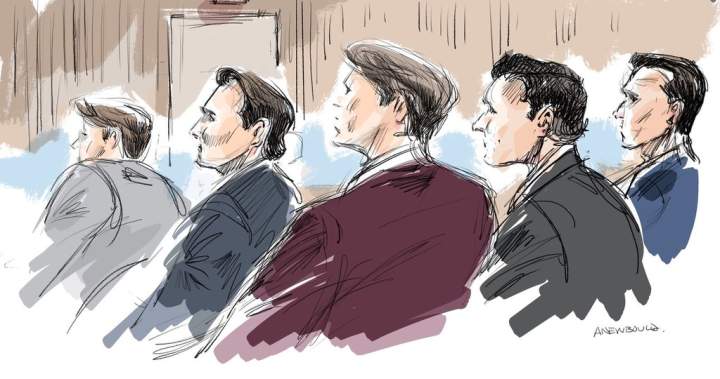As the courtroom fell silent following the not guilty verdict in the high-profile sexual assault case involving five former World Junior hockey players, the ripple effects quickly spread across Canada, igniting impassioned responses from survivor advocates and legal experts alike.
The case, which stemmed from allegations of a 2018 incident in London, Ontario, concluded Tuesday with all five defendants – NHL players Alex Formenton, Carter Hart, Michael McLeod, Cal Foote, and Dillon Dubé – being acquitted of sexual assault charges. Justice Bruce Thomas delivered the verdict after a trial that placed Canada’s hockey culture under intense scrutiny.
“These verdicts send a chilling message to survivors across the country,” said Erin Whitmore, executive director of the Women’s Sexual Assault Centre of Renfrew County. “Many are watching this case and asking themselves why they should come forward if this is the outcome.”
The trial centered around events following a Hockey Canada gala in June 2018, where a woman, identified in court documents as E.M., alleged she was sexually assaulted by multiple hockey players in a hotel room. The case gained national attention not only for the involvement of prominent hockey figures but also for questions about institutional handling of the allegations.
Legal experts note that sexual assault cases often face significant hurdles in court. “The burden of proof in criminal cases requires evidence beyond a reasonable doubt, which can be particularly challenging in cases where alcohol was involved and memories may be imperfect,” explained Toronto-based criminal defense attorney Morgan Williams, who was not involved in the proceedings.
The verdict has sparked renewed debate about Canada’s legal approach to sexual assault cases. Statistics Canada data shows that only about 5% of sexual assaults are reported to police, with even fewer resulting in convictions.
Hockey Canada, which settled a lawsuit with E.M. in 2022, has since undergone significant organizational changes, including leadership overhauls and new policies regarding sexual misconduct. The organization declined to comment on the specific verdict but reiterated its commitment to creating “safe and inclusive environments” in hockey.
“The conclusion of this trial doesn’t end the conversation about toxic masculinity and power dynamics in elite sports,” said Dr. Allison Reid, a sports psychologist specializing in athlete behavior and team cultures. “Regardless of the legal outcome, this case has forced important discussions about consent, accountability, and the responsibilities that come with being in positions of privilege.”
On social media, reactions revealed deep divisions, with some expressing relief at what they viewed as justice served, while others voiced concern about the message the verdict might send to sexual assault survivors contemplating coming forward.
Support centers across Canada reported increased call volumes following the verdict announcement. “We always see a spike in people reaching out when high-profile sexual assault cases conclude,” said Jennifer Robertson of the Sexual Assault Support Centre of Waterloo Region. “These moments retraumatize many survivors who see parallels to their own experiences.”
As the national conversation continues, many advocates are calling for broader systemic changes beyond the courtroom. “This case represents a moment for reflection about how we support survivors, how we teach consent, and how we hold powerful institutions accountable,” Whitmore added.
The question now facing Canadians extends beyond this particular verdict: How do we create systems where survivors feel empowered to seek justice while ensuring due process protects the rights of the accused?











